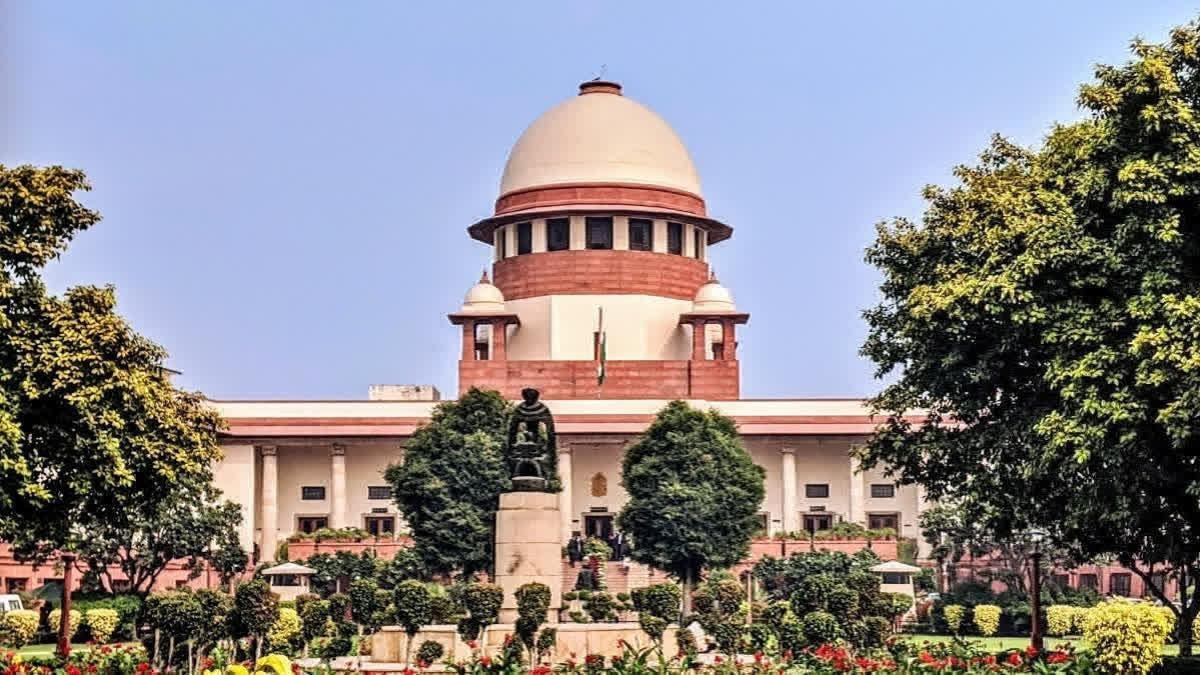New Delhi: The Supreme Court Thursday observed that over the last hundred years, Aligarh Muslim University (AMU) has continued to be an institute of national importance, without the minority tag, how does it matter for the people whether AMU is a minority institution or not? It is only the brand name -- AMU.
A seven-judge headed by Chief Justice of India D Y Chandrachud and comprising Justices Sanjiv Khanna, Surya Kant, J B Pardiwala, Dipankar Datta, Manoj Misra and Satish Chandra Sharma, is hearing the hugely disputed minority status of AMU.
Justice Datta asked advocate Shadan Farasat, representing a petitioner, "Over the last hundred years without the minority institution tag, Aligarh Muslim University (AMU) has continued to be an institute of national importance. How does it matter that if we are not with you on Basha…".
In 1967, a five-judge Constitution Bench in the S Azeez Basha versus Union of India case held that since the Aligarh Muslim University was a central university, it cannot be considered a minority institution. The university got back its minority status when Parliament passed the AMU (Amendment) Act in 1981.
Justice Datta further queried Farsat, how it will create great damage without the minority tag, institution (AMU) has continued to be an institute of national importance, how does it matter for the people whether AMU is minority institution or not? It is only the brand name -- AMU.
Farasat said "Until Basha, it was considered a minority institution….today, due to status quo order of the lordships on the 1981 amendment, it continues to be a minority institution. If lordships uphold Basha, for the first time clearly now it will become a non-minority institution".
Farasat said women Muslim students are especially sent to AMU because of the minority status and stressed that these are sociological facts.
Justice Sharma queried, is there any other minority university in India which is hundred perc ent funded by the Centre. The court was informed that Jamia Millia Islamia university in Delhi is substantially funded by the Centre, and there may be others, but data is not available now.
During the daylong hearing on the third day, the CJI orally observed, "The object of Article 30, is not, if I may use the expression do not take it otherwise, to ghettoise the minorities….", and added that if you let other people associated in the administration, it doesn't detract from your character as a minority institution.
The bench, stressing on the word "choice" used in Article 30(1), observed that the minorities are given a choice to either administer the institute themselves or get it done by others.
The bench noted "Article 30 does not mandate that the administration has to be by the minority itself. What Article 30 contemplates and recognises is the right, mainly the right of choice, the discretion given to minorities to administer in a manner which they deem appropriate….".
The CJI queried senior advocate Kapil Sibal, representing AMU Old Boys Association, "your argument is this, on which we will hear the other side, if you apply the expression administer in a very strict sense namely there should not be no outsider at all or excluding on the ground that there only 37 out of 180, a minority can never run a university".
Sibal said, "no my lords, in fact it is contrary to judgments laid down by this court. Because this court had said you can have whatever secular education…St Stephens had only 6 per cent minority students at one point in time, increased to 14 per cent in some point in time….and this court in TM A Pai said it can go up to 50 per cent...”.
Sibal said that he was a part of the governing body of St. Stephen's College in Delhi and most of the governing body members were non-minority people. Sibal stressed that minorities may not possess expertise in dealing with all aspects and may have to involve others. Sibal further said in some technical areas the institution may not have knowledge, especially in medical college and then we get people from outside to help us and they may be in majority, and "that doesn't destroy the character of my institution".
The CJI said, "a factor to be considered is that by statute itself, you have to induct into your core a large number of people who are not minority….does that alter?” Sibal said, "I can challenge it…".
On Wednesday, the apex court had asked the university to justify the minority character of its administration when its 180 member governing council had just 37 Muslim members. The apex court will continue to hear the matter on January 23.
A Constitution Bench is hearing pleas by AMU and others, where it will decide on the question whether an educational institution created by a parliamentary statute enjoys minority status under Article 30.
In 2005, AMU had reserved 50 per cent seats in postgraduate medical courses for Muslim candidates by claiming it to be a minority institution, which was set aside by the Allahabad High Court. In 2006, Centre and AMU challenged the High Court's decision before the Supreme Court. In 2016, the Centre withdrew from the appeal contending that it does not acknowledge the minority status of the university.
The top court had on February 12, 2019 referred to a seven-judge bench the hugely contentious issue of the minority status of AMU. A similar reference was also made in 1981.
- " class="align-text-top noRightClick twitterSection" data="">
Read more:



